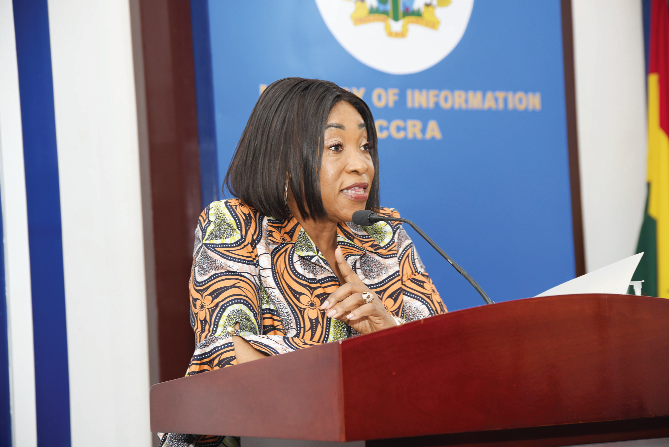The Minister of Foreign Affairs and Regional Integration, Ms Shirley Ayorkor Botchwey, has said Ghana’s election to the United Nations (UN) Security Council will help bring the perspective of Africa on global issues to the fore.
She said Ghana's representation on the council would help ensure a peaceful and resilient environment for the economic well-being of all West Africans.
Addressing a press conference in Accra yesterday to brief the media on Ghana’s election to the UN Security Council on June 11, Ms Botchwey said in the new role, the country intended to leverage its previous and current experience as the Chair of ECOWAS and active member of the AU to prioritise issues of conflict prevention, post-conflict reconstruction and the strengthening of partnerships between the UN and regional arrangements in dealing with conflict situations.
“The theme we have chosen for our term: “Enhancing Global Peace and Security for Sustainable and Inclusive Development”, reflects the vision of ECOWAS to ensure a peaceful and resilient environment for the economic well-being of all our peoples,” she said.
Ghana joins UN Security Council
At its 75th General Assembly in New York last Friday, the UN elected Ghana, Albania, Brazil, Gabon and the United Arab Emirates (UAE) to the UN Security Council, which is charged with maintaining international peace and security, for a two-year term, starting from January 1, 2022.
To ensure geographical representation, seats are allocated to regional groups. But even if candidates are running unopposed in their group, they still need to win the support of more than two-thirds of the UN General Assembly.
The candidates ran mostly unopposed within their regions for a spot on the 15-member body, except for Gabon and Ghana, who were challenged by the Democratic Republic of the Congo (DR Congo) for the two available seats in the African Group.
The elected countries will replace Estonia, Niger, St Vincent and the Grenadines, Tunisia and Vietnam.
Ghana received 185 votes, Gabon 183 votes, UAE 179 votes, Albania 175 votes and Brazil 181 votes.
The DR Congo garnered three votes, while Peru and Iran had a vote each.
It is the fourth time that Ghana has sought a non-permanent membership of the UN Security Council.
Collaborate for peace
The Foreign Minister said Ghana’s tenure on the Security Council would be used to advance stronger and deeper collaboration and cooperation between the UN and regional bodies in a manner that enhanced complementarity, ensured effectiveness of coordinated action and strengthened burden-sharing arrangements with the UN.
That, she said, would help mobilise increased financial support for regional and continental initiatives and peace-building missions.
“Ghana’s membership is an opportunity to bring our values, experiences, expertise and influence to bear on the work of the UN in addressing the challenges confronting our world today, including violent extremism, terrorism, malicious cyber threats, illicit trafficking in arms, to mention a few.
“Success in the maintenance of peace and security is key to achieving the Sustainable Development Goals (SDGs), especially in our region and our country,” she said.
Benefits
Explaining the importance of the membership of the Security Council to Ghana, Ms Botchwey said there would be both tangible and intangible benefits for Ghana that would help the country to achieve the Ghana Beyond aid agenda.
“The pathways that open for close collaboration with development partners and the opportunities to deepen cooperation with key players and actors in the international community should contribute to the ongoing work to achieve a Ghana Beyond Aid.
“The overwhelming support for Ghana confirms the trust we enjoy from member states and their confidence in our contribution to the work of the Security Council over the next two years,” she emphasised.
Vaccine production
Ms Botchwey further indicated that Ghana’s current status would also help address issues such as the inequitable distribution of COVID-19 vaccines which had become a global concern, as African countries struggled to find vaccines to purchase.
Ghana’s place on the council, she said, would help bring the concerns of Africa to the table for discussion, including pushing to get the permission to produce its own vaccines.
Asked why Ghana was unable to purchase vaccines from manufacturers in Russia, Ms Botchwey explained that although Ghana had an excellent relationship with Russia, “it is difficult, even if you have money, to procure vaccines from the source; it is almost impossible”.
She said the ministry had been involved in the quest to procure the vaccines, but all plans to purchase them directly from a manufacturer had proved futile.
“From the beginning, we were involved, but I can assure you that it is difficult to procure vaccines directly from manufacturers and the President, Nana Addo Dankwa Akufo-Addo, made calls at his level. I also made calls at my level, but it was just impossible,” she said.

